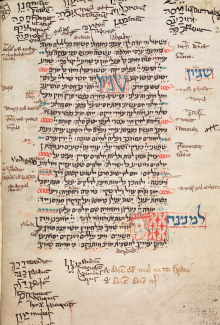Event

In the early 1230s, Robert Grosseteste, Franciscan lector at Oxford, Bishop of Lincoln, and one of the intellectual giants of thirteenth-century England, penned his De cessatione legalium, in which he sets out to show that continuing observance of the Mosaic law by Christians is heretical. At about the same time, Grosseteste wrote a preface to a bilingual Hebrew-Latin psalter, one of about a dozen Hebrew manuscripts from a group of thirteenth-century English Hebraists based principally in Oxford. Oxford was the home to a thriving Jewish community, economically prosperous and intellectually active. While historical records indicate tensions and occasional violence between Christians and Jews, these manuscripts testify to intellectual exchanges and collaboration.
John V. Tolan works on the history of religious and cultural relations between the Arab and Latin worlds in the Middle Ages. He received a BA in Classics from Yale, an MA and a PhD in History from the University of Chicago, and an Habilitation à diriger des recherches from the Ecole des Hautes Etudes en Sciences Sociales in Paris. He has taught and lectured in universities in North America, Europe Africa and the Middle East and is currently Professor of History at the University of Nantes and co-director of the Institut du Pluralisme Religieux et de l’Athéisme (www.ipra.eu). From 2010 to 2015, he was director of a project funded by the European Research Council, “RELMIN: The legal status of religious minorities in the Euro-Mediterranean world (5th-15th centuries)” (www.relmin.eu). He is author of articles and books, including Petrus Alfonsi and his Medieval Readers (Gainesville: University Press of Florida, 1993), Saracens: Islam in the Medieval European Imagination (New York: Columbia University Press, 2002), Sons of Ishmael: Muslims through European Eyes in the Middle Ages (Gainesville: University Press of Florida, 2008), and Saint Francis and the Sultan: The Curious History of a Christian-Muslim Encounter (Oxford: Oxford University Press, 2009; French edition published in Paris: Seuil, 2007). From January to June, 2016, he is a research fellow at the Kulturwissenschaftliche Kolleg Konstanz, where he is working on his current book project, a history of English Jewry during the reign of Henry III (1216-72).
Sponsored with Penn's Faculty Working Group in Medieval Studies and Near Eastern Languages and Civilizations department.
